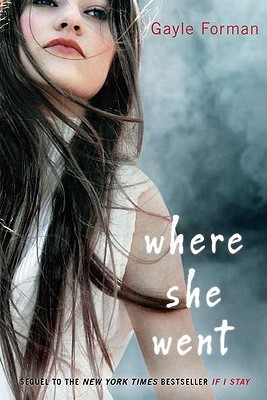Where She Went
By: Gayle Forman

It's been three years since Mia walked out of Adam's life. And three years he's spent wondering why. When their paths cross again in New York City, Adam and Mia are brought back together for one life-changing night. Adam finally has the opportunity to ask Mia the questions that have been haunting him. But will a few hours in this magical city be enough to lay their past to rest, for good - or can you really have a second chance at first love?
Again, I don't have too much to say about this book. I get why this series is so well loved, it's compelling, emotional, and very well written. Gayle Forman knows how to tell a story and how to use characterization to its full potential.
I liked If I Stay, but I enjoyed this one more. I felt for the characters more, and I think that was because Adam's narrative was much easier for me to connect with than Mia's. I still like the flashback format, I think it keeps the story fresh, even when not much is happening in the present (like at the beginning of this book). And I think this format worked better in this book than in If I Stay, if only because what was happening in the present was much less traumatic and yet no less emotional. I thought Adam was sort of bland in If I Stay, so I liked the pieces of family relationships we got much more. But in this book, I really liked Adam's character. He's cynical and jaded, but he wasn't always that way. I liked seeing my perception of him change, learning about his past piece by piece.
I do wish we learned more about Adam's parents. It felt like a very crucial missing piece, because they were only mentioned once or twice. Though I understand why they weren't necessary to the plot or the character development. They still felt absent, however.
As I said in my review of If I Stay, I understand why people love these books. They're really good stories with touching characters. I just didn't connect the characters as much as I wanted to. I felt for them, of course, and I liked them. I feel like I understood them fully, which is the sign of great characterization. But I didn't relate to them, which is important to me in contemporaries like this (in any book, really, but especially in contemporaries, which are typically less conceptual than fantasy, sci-fi, or dystopian).
One aspect of this book that I loved was the song lyrics before every chapter. It indirectly gave light to all that Adam felt in those months after Mia. It made it feel like hurt more than exposition, even brilliant exposition, ever could. Thinking about Adam writing those words, singing them over and over again on tour, was one of the most painful parts of reading this book. Which I really loved.
Quotes:
“Standing here, in this quiet house where I can hear the birds chirping out back, I think I’m kind of getting the concept of closure. It’s no big dramatic before-after. It’s more like that melancholy feeling you get at the end of a really good vacation. Something special is ending, and you’re sad, but you can’t be that sad because, hey, it was good while it lasted, and there’ll be other vacations, other good times.”
“In the calculus of feelings, you never really know how one person's absence will affect you more than another's.”
“That’s the thing you never expect about grieving, what a competition
it is.”
it is.”
“Except even at the start, when we were in that can't-get-enough-of-you-phase, there was like some invisible wall between us. At first I tried to take it down, but it took so much effort to even make cracks. And then I got tired of trying. Then I justified it. This was just how adult relationships were, how love felt once you had a few battle scars.”
No comments:
Post a Comment